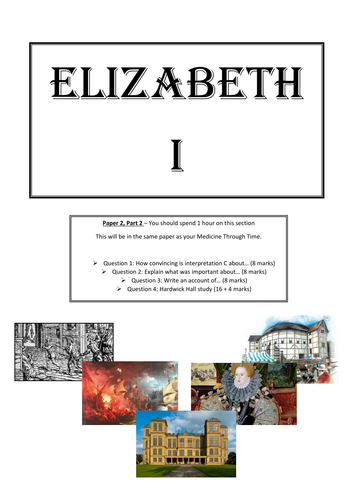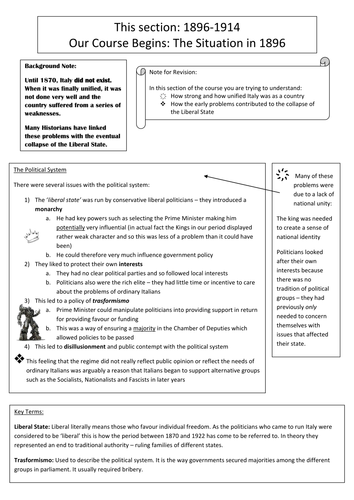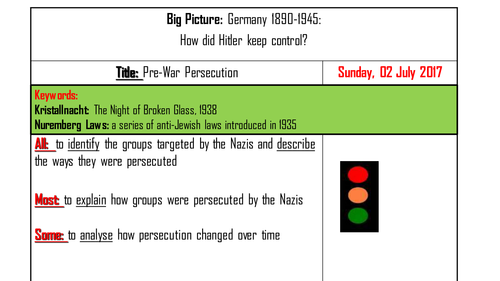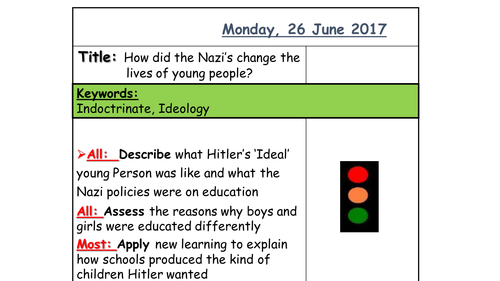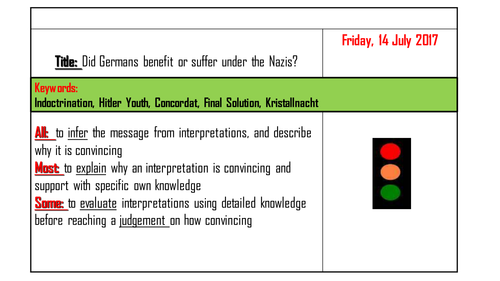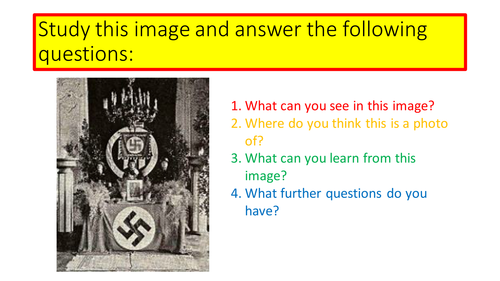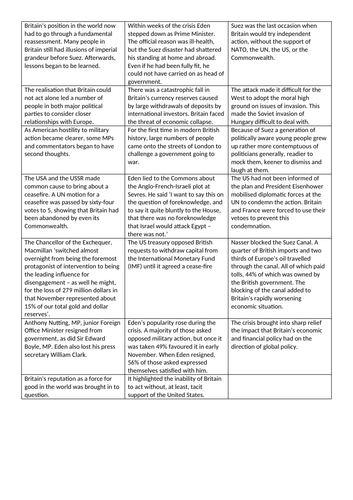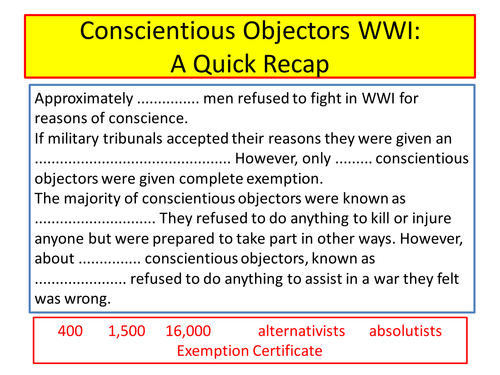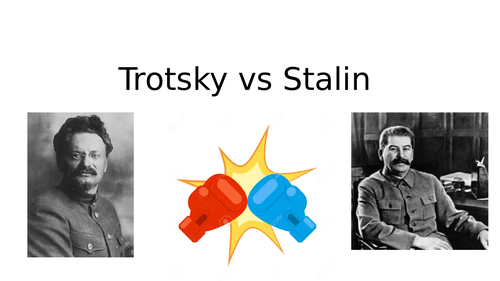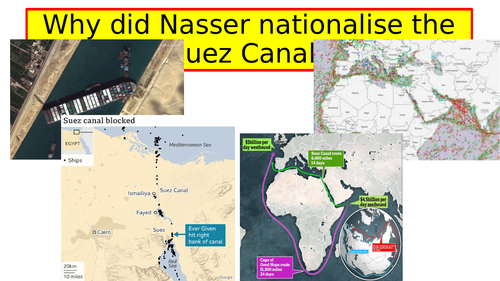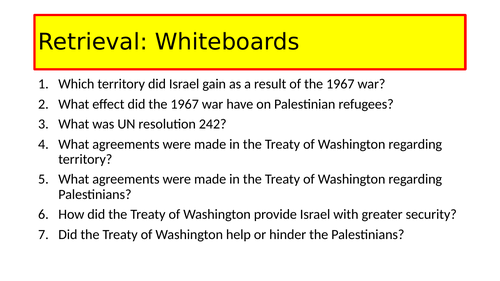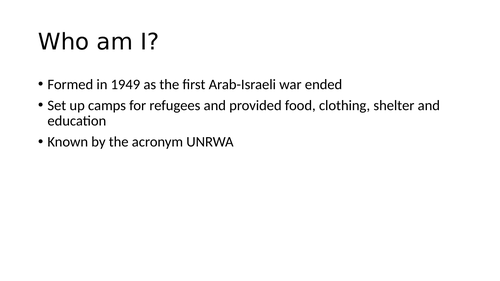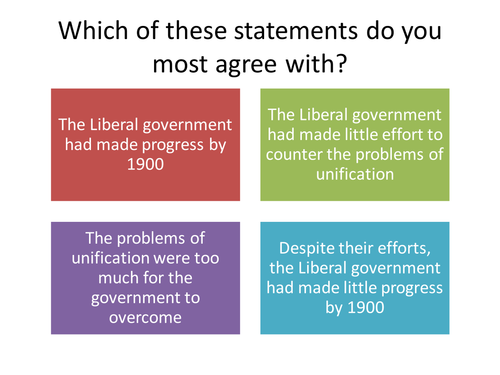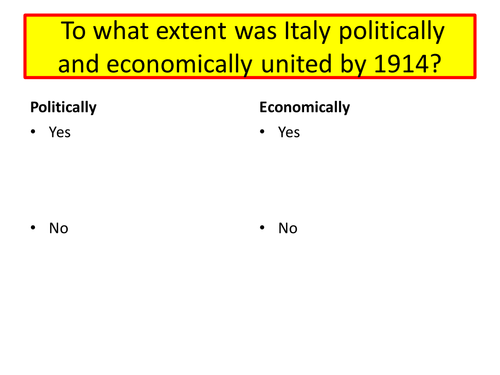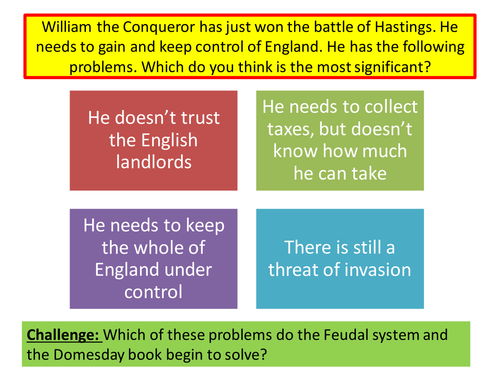
170Uploads
40k+Views
18k+Downloads
All resources

AQA 8145 GCSE Elizabeth I Revision Guide
A revision guide tailored to the AQA Elizabeth I specification for GCSE. Includes practice questions, quizzes. The information is broken down to make it easier for students to use in their own revision, and pictures and acronyms will help students to recall the information ready for their GCSE exam.

Italy and Fascism Revision Guide A-level
A revision guide for A-level students on the topic of Italy and Fascism. The guide covers the course content while helping students to form analytical views around key questions for their exams.
Bundle

AQA 8145 Germany - Social policy
A three lesson series of GCSE lessons examining the impact of Nazi social policy on youth, women and the Church. Includes exam questions specific to the AQA GCSE exam.

AQA 8145 Germany - Pre-war Persecution
A GCSE lesson looking at the persecution of various groups in Germany, including a more detailed analysis of how persecution of Jews changed over time up until 1939. Students will understand the reasons behind the persecution and categorise them, and create a timeline of Jewish persecution.

AQA 8145 Germany -Nazi Education
A GCSE lesson in which students analyse the ways that the Nazis controlled education. Students will evaluate the effectiveness of Nazi methods of control.

AQA 8145 Germany - Did Germans benefit or suffer
A summary GCSE 1-2 lesson series for the section of the specification for AQA on social policy. Students will analyse interpretations about whether people benefited or suffered under Nazi rule according to social policy. Students will prepare an answer to the 8 mark question asking 'Which interpretation do you find more convincing about...'. Includes differentiated resources for high, middle and low ability students.

Crime and Punishment - Conscientious objectors WWI
A GCSE lesson for the Edexcel course on Crime and Punishment. Students will use a range of characters to understand different attitudes to conscientious objectors and the different reasons for conscientious objection during WWI.

AQA 8145 Germany - The Christian Church Concordat
A GCSE lesson which examines Nazi policy towards the Christian Church in Germany. Students will evaluate the reasons for the Concordat and the extent to which the Nazis were successful in controlling the Church.

AQA 8145 Elizabeth I - Puritan threats
A GCSE lesson in which students will gain an understanding of the threat posed by Puritans to Elizabeth's religious settlement. Students will evaluate the extent to which puritans posed a threat to Elizabeth's rule.

Making of modern Britain - Suez Crisis
An A-level lesson in which students examine the significance of the Suez Crisis on Britain. Students will sequence the events leading to the crisis, before analysing the impact of the crisis on Britain, and in particular will gain an understanding of how Britain’s place in the world changed as a result of Suez.

Crime and Punishment - Conscientious Objectors WWII
A GCSE lesson on conscientious objection in WWII. Students will compare COs in WWI and WWII. They will evaluate the extent to which the attitudes of the government and the public changed.

Russia - Stalin's defeat of Trotsky
An A-level lesson looking at how Stalin defeated Trotsky in his rise to power. Students will compare the relative strengths of Stalin and Trotsky by completing a set of Top Trumps cards (included in the PowerPoint) in order to evaluate the relative strengths of the two leadership contenders. Students will reach judgements on their strengths in areas such as their positions within the party, their ideology and their ability to position themselves as Lenin’s successor. Ultimately, students will reach judgements on the roles of Stalin and Trotsky in the outcomes, and compare the relative importance of a range of factors. Includes a retrieval task from their previous learning.

Why did Nasser nationalise the Suez Canal?
An A-level lesson for OCR Y321 on the chain of events leading to the nationalisation of the Suez Canal. Students will understand the chronology and the competing aims of the Western powers versus Egypt.
Students will complete a chronology card sort and use these to understand the competing aims of Western powers and Egypt surrounding the Suez Canal. Students will explain attempts taken by Nasser to exert Egyptian independence and how they competed with Britain’s attempts to hold on to influence in the region. Students will finish by reaching a judgement on the motivations behind Nasser’s decision to nationalise the Suez Canal.

Middle East - first Intifada Y321
An A-level lesson for OCR Y321 focused on the theme of Zionism, Israel and the Palestinian Issue. Students will consider the causes and consequences of the first Intifada by considering the role of Jewish settlements in occupied territories, and the significance of the Intifada for the Palestinian issue. Students will have the opportunity to compare the significance of this event to those they have already studied and begin to consider where the greater turning points are.

Israeli-Palestinian peace-making 1990s
An A-level lesson designed for OCR Y321 in which students will consider the factors influencing the successes and failures of the Israeli-Palestinian peace process in the 1990s. Students will use a card sort to put key events into chronological order to gain an understanding of the narrative. From this students will pick out the factors helping and hindering the peace process. The lesson is linked to the essay stem: ‘Zionism was the most important influence on attempts to resolve the Palestinian issue’ and will prepare how the 1990s supports and challenges this statement. Students are also given the opportunity to bring in their existing knowledge to consider how the factors at play in the 1990s were also apparent in the preceeding events so that they begin to draw comparisons and form a synthesis across the period as a whole.

Italy and Fascism - Threats to Mussolini's power
An A-level lesson on the extent to which Mussolini faced threats subsequent to the Matteotti Crisis. The lesson is planned around an example essay question and will require students to evaluate the extent to which institutions could challenge Mussolini's power.

Italy and Fascism - Growth of Fascism
An A-level lesson in which students analyse the reasons for growing support for fascism in the post-war years. Students will analyse the reasons why different groups within Italy supported Mussolini and the fascists and examine how support grew over time.

Italy and Fascism - Giolitti's Italy
An A level lesson in which students evaluate the extent to which Giolitti succeeded in creating a stable Italy. Students will evaluate both political and economic stability and understand the key features of Giolitti's policies.

Italy and Fascism - Impact of WWI
An A-level lesson on the impact of WWI on the stability of Liberal Italy. Students will understand the role that the war played in the collapse of the Liberal state in Italy and gain an understanding of the key events for Italy.

William the Conqueror: Feudal system and Domesday book
A differentiated KS3 lesson in which students prepare for a 12 mark essay question on which method of control was more effective for William the Conqueror. Students should have studied both methods prior to this lesson.

